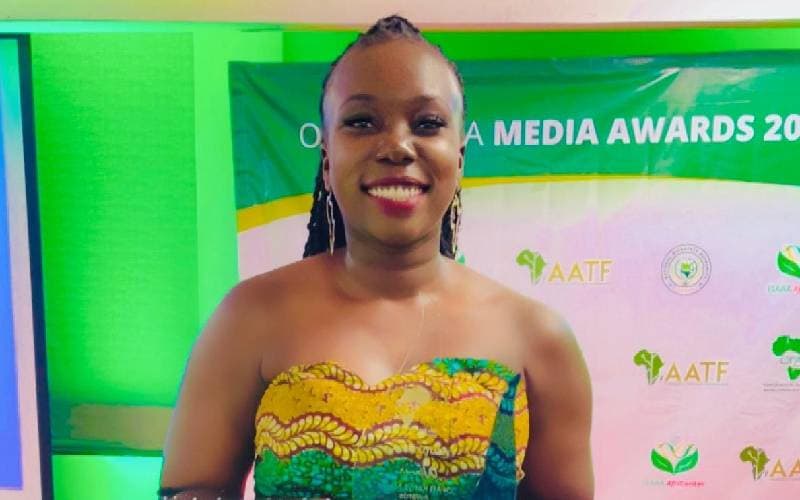We're loading the full news article for you. This includes the article content, images, author information, and related articles.
The award from the Open Forum on Agricultural Biotechnology highlights the critical role of specialized reporting in shaping Kenya's food security and climate change discourse.

NAIROBI, Kenya – Standard Group journalist Rosa Agutu was named the overall winner at the 2025 Open Forum on Agricultural Biotechnology (OFAB) Kenya Media Awards, a significant recognition of her in-depth reporting on science and innovation. The ceremony, held in Nairobi on Friday, 24 October 2025, celebrated journalism that bridges the gap between complex agricultural science and the Kenyan public.
Agutu also won the top prize in the television category, underscoring her skill in translating technical subjects into compelling broadcast stories. Upon receiving the award, she emphasized the vital role of the media in making science accessible. "For me, this recognition highlights how powerful storytelling can be in promoting scientific understanding and improving lives," Agutu stated. "Media has a vital role to play in making science accessible to all, and I'm committed to continuing that mission."
The annual awards are organized by OFAB, a project of the African Agricultural Technology Foundation (AATF) that operates in ten African countries, including Kenya. OFAB's mission is to facilitate constructive dialogue and enhance knowledge-sharing among scientists, policymakers, farmers, and the public to help inform choices on agricultural biotechnology. The awards are a key part of this strategy, designed to honour accurate, ethical, and impactful reporting that can shape informed debates on food security and sustainable development.
Agutu's award comes at a critical time for Kenya's agricultural sector, which accounts for approximately 33% of the nation's GDP and employs over 70% of its rural population. The country faces mounting pressure from climate change, a rapidly growing population, and declining agricultural productivity, making innovation a cornerstone of national food security strategies.
Agricultural biotechnology, including the development of genetically modified (GM) crops, is presented by scientists and organizations like AATF as a powerful tool to address these challenges. Proponents argue that technologies like Bt cotton, which was commercially approved in Kenya in 2019 to resist the destructive African bollworm pest, can significantly boost yields, increase farmer incomes, and reduce reliance on chemical pesticides. Research is also underway on other vital crops, including disease-resistant cassava and insect-resistant maize.
However, the adoption of GM technology remains a subject of intense public and political debate, often fueled by misinformation regarding its safety and long-term impacts. Dr. Margaret Karembu, Chair of OFAB-Kenya, noted during the awards ceremony that despite clear scientific evidence and strong regulation, climate-smart biotech solutions still face opposition. This underscores the crucial role of journalists like Agutu in fostering a more evidence-based public dialogue.
The OFAB awards aim to cultivate a community of journalists equipped to report on these complex issues with scientific accuracy and clarity. Entries for the 2025 awards were assessed by an independent panel on criteria including scientific accuracy, originality, clarity, and overall contribution to public understanding. This year, a new category for digital media was introduced, acknowledging the growing influence of online platforms in shaping public narratives.
Speaking at the event, Nehemiah Ngetich, the Acting CEO of the National Biosafety Authority (NBA), pledged to deepen the agency's collaboration with the media. He stressed that factual reporting is essential for guiding policy and innovation. "When reporters bring accuracy, clarity, and context to complex topics... they equip citizens and decision-makers to engage with evidence rather than rumors," Ngetich said. The NBA, a state corporation under the Science, Technology and Innovation Act, No. 28 of 2013, is responsible for regulating and assuring quality in the sector.
The need for stronger collaboration between scientists and journalists has been a recurring theme in recent national discussions. Experts argue that bridging the trust gap is essential for translating research into impactful, real-world solutions that the public can understand and support. Vitumbiko Chinoko, a Project Manager at AATF, recently highlighted this point at the World Congress of the International Federation of Agricultural Journalists, stating, "Without the media, many scientific breakthroughs would remain confined in the labs."
Agutu's achievement serves as a benchmark for excellence in the field, celebrating the power of journalism to not only inform but also empower society to navigate the critical agricultural and environmental challenges of the 21st century.
Keep the conversation in one place—threads here stay linked to the story and in the forums.
Sign in to start a discussion
Start a conversation about this story and keep it linked here.
Other hot threads
E-sports and Gaming Community in Kenya
Active 9 months ago
The Role of Technology in Modern Agriculture (AgriTech)
Active 9 months ago
Popular Recreational Activities Across Counties
Active 9 months ago
Investing in Youth Sports Development Programs
Active 9 months ago